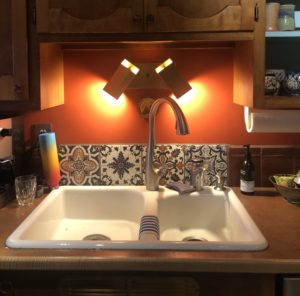
Last night, after the Governor of Montana declared a shelter in place for our state, I took a picture of my kitchen sink and posted it on Facebook with the caption:
“Hello beloveds. This is where I do my daily schmata*: washing dishes, worrying about our world, replenishing my family… How about you? Where do you tend to what needs to be done?”
It may seem odd to share a photo of something so mundane, and to invite a glimpse into others’ homes and hearths. Especially on social media – a platform that feeds on the brighter side of life – the family vacations, job promotions, kid awards and recent weight loss.
And yet, as COVID-19 upends our lives, it is to the rhythms of daily life I turn for solace. I’m reminded that when you take away all the self-induced busyness we’ve built into our lives, it’s the day-in-day-out acts of washing dishes, sweeping floors, feeding the dog and calling a neighbor that define our humanity, that give us purpose and use.
It reminds me of one of my favorite poems, Marge Piercy’s To Be of Use, which ends:
The work of the world is common as mud.
Botched, it smears the hands, crumbles to dust.
But the thing worth doing well done
has a shape that satisfies, clean and evident.
Greek amphoras for wine or oil,
Hopi vases that held corn, are put in museums
but you know they were made to be used.
The pitcher cries for water to carry
and a person for work that is real.
And it reminds me of the work we do as community builders. Sure, we love an audience at a conference, to have our research and tools shared, to be a source in a thoughtful piece of journalism. But that doesn’t define our work.
What makes us community builders is the day-in-day-out actions of thinking how to best bring people together in a way that is safe and playful and productive. Of answering that last-minute call or email from a colleague who’s scrambling to sort through next steps in a challenging collaboration. Of building people up, not taking them down. Of never getting too far from the ground floor – the community-level – in any of the work we do.
During these unprecedented times, each of us is striving to be of use to our families and to our communities, as best we can.
And so I ask you, Where do you tend to what needs to be done?
*Schmata is a Yiddish term for housedress – my beloved friend and mentor Simone Plastrik used this term for the daily work of paying bills, sorting mail… the unglamorous but necessary tasks of daily living.

Thanks, Deb. Your words and those that you have quoted are grounding. Yes, everything is necessarily different, almost chaotic, but if we are able to pull back to the simplicity of what managing this virus means—being thoughtful about how we are all interconnected—we can find a way to embrace and learn from that chaos, to let it help us see life through a simpler, yet still quite interconnected, lens. Thanks again.
Thank you, Eric!